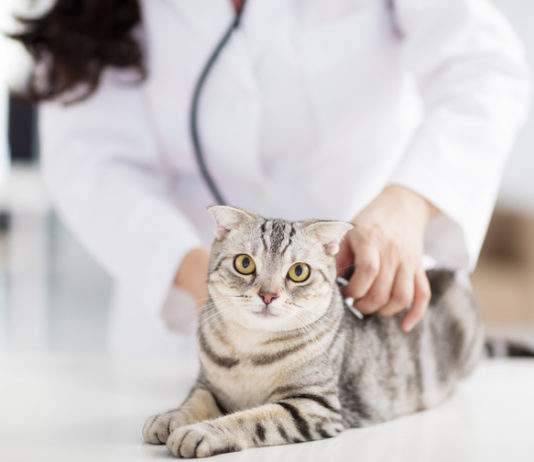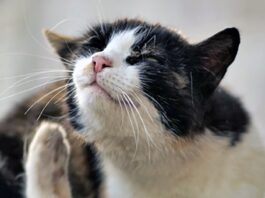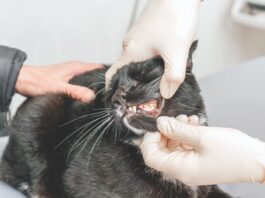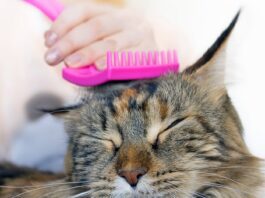Ask Elizabeth: March 2013
As you know, we cats are very sensitive creatures, but in your case, as with other cats with feline hypersensitivity syndrome (FHS), this sensitivity seems to be ratcheted up. FHS is a recognized syndrome in the feline world, although the definitive cause is not clear. While it is not, in and of itself, believed to seriously affect overall health or longevity, a few important points regarding this unusual behavioral syndrome are worth making, especially for our human friends who are commonly puzzled by its manifestations. FHS, also variably referred to as rolling skin syndrome and atypical neurodermatitis, is characterized by dramatic twitching or rippling of the skin, most commonly on the back between the middle of the spine and the base of the tail or in the flank region, with intermittent jerking of the body and exaggerated tail movements.
Ask Elizabeth: February 2013
As you know, we cats are very sensitive creatures, but in your case, as with other cats with feline hypersensitivity syndrome (FHS), this sensitivity seems to be ratcheted up to varying degrees. FHS is a recognized syndrome in the feline world, although the definitive cause is not clear at this time. While it is not, in and of itself, believed to be serious with respect to its effect on overall health or longevity, a few important points regarding this unusual behavioral syndrome are worth making, especially for our human friends who are commonly puzzled by its manifestations. FHS, also variably referred to as rolling skin syndrome and atypical neurodermatitis, is characterized by dramatic twitching or rippling of the skin, most commonly on the back between the middle of the spine and the base of the tail or in the flank region, with intermittent jerking of the body and exaggerated tail movements.
Ask Elizabeth: January 2013
HCM is diagnosed by echocardiography, and it is important to rule out high blood pressure and hyperthyroidism in cats with thickened heart muscle before arriving at a diagnosis of HCM, as these conditions can also cause thickening of the heart. Although HCM can be a very serious disease that can lead to congestive heart failure or the formation of potentially life-threatening blood clots, cats may live with HCM for prolonged periods of time (months to years) without overt signs of illness.
Ask Elizabeth: December 2012
Our family is excited about adopting a new kitten from the local shelter (they are so cute!), but we are admittedly kitty illiterate! We were wondering if you might be able to provide some sage advice to us feline rookies.
Ask Elizabeth: November 2012
Q: My wonderful rescued cat scratches hot spots occasionally. They look just awful but heal nicely and the hair comes back and fills the spot in. I keep an eye on them for infections, but none has ever become infected. What on earth causes my cat to do this to herself? She’s an only cat and there has not been any change in the food I feed her. Sincerely,Hot Under the Fur …
Ask Elizabeth: October 2012
Toxoplasmosis is caused by the protozoal parasite Toxoplasma gondii, which requires passage through a cat to produce infective oocysts that can subsequently infect other warm-blooded animals. Cats usually acquire toxoplasmosis by eating infected prey, and approximately 20 percent of cats will begin to shed toxoplasma oocysts in their feces after ingesting toxoplasma. Oocysts in cat feces take between 24 and 48 hours to become infective for other animals, so if you are able to remove the feces from your garden within 24 hours (wearing gloves and washing hands thoroughly afterward), you will significantly decrease the likelihood of having your vegetables be a source of toxoplasma infection.
Ask Elizabeth: August 2012
I have been purring nearly my whole life so I should be an expert! However, like many feline characteristics, purring is mysterious — even to me! Let me share what my friends at the Cornell Feline Health Center have to say about purring. At its core, purring is a means of communication — but cats purr in a variety of situations: when they are comfortable and content, of course, but also when they are anxious, injured or ill. What, exactly, a cat is communicating in these various situations is open to interpretation. The most straightforward purring is done by baby kittens. Starting at about two days of age, kittens purr in the presence of their mother, and in response to nursing. This early purring is likely to be an ‘I’m OK’ signal to the queen, and along with kneading movement of the front paws on the mammary gland area, may serve as a stimulus for milk letdown.
Ask Elizabeth: September 2012
I work at a large no-kill animal sanctuary with special-needs cats. Often when one becomes ill and stops eating, we tempt him or her with people food like baby food or boiled chicken. I have heard a lot of conflicting things about feeding cats baby food or straight meat. Someone recently told me that a good all-meat baby food and straight chicken are nutritionally complete, but I have read in a few places that cats need other nutrients like taurine and vitamins A and D or they will get very sick. Does straight meat provide full nutrition for cats? In the wild, how do cats get full nutrition if meat does not provide it all? What is the best kind of food for our dear kitties?
Ask Elizabeth: July 2012
Dear Elizabeth: We adopted a new kitten from a local rescue group last month, and she is just perfect. Although she had been tested for the leukemia virus and FIV by the terrific group that saved her from the street, we took her to our veterinarian right away so that she could be examined before we introduced her to our two older cats. After a clean bill of health, we brought Bunny home, and she has become part of the family. The problem is that before we scheduled her spay surgery, she came into heat. What a scene!
Ask Elizabeth: June 2012
Aromatherapy, for readers who may not be acquainted with the term, is the practice of releasing the essences of various botanicals into the air for beneficial effects. Some essences are utilized as a form of alternative medicine and are said to ease pain, diminish inflammation, fight infection and reduce stress, among other things. Other essences are used, as is the case for you and your wife, for aesthetic purposes because they smell good. While the medicinal value of aromatherapy is debatable (and contested by some medical experts), there is no doubt that any household can get a pleasant boost from such delightful fragrances.
Ask Elizabeth: May 2012
I’m hoping that you can help me solve a very frustrating problem. My cat Jessica is a six-year-old Siamese. Her skin has become very dry and flakey, and I think it must be very itchy. She’s constantly scratching at herself, sometimes so roughly that little clumps of her coat fall out. I haven’t taken her to see a veterinarian yet, but a neighbor told me that I should be giving Jessica omega-3 supplements. But omega-3 comes from fish oil, and I think that Jessica is allergic to fish, so I’m afraid to do that. Are there any other sources of omega-3? What other ingredients in her food could be making her so uncomfortable?
Ask Elizabeth: April 2012
Dear Elizabeth: Last summer, my husband and I became the proud keepers of Miss Looci, a four-week-old rescue cat. She’s a lovely, strictly indoor cat — long-haired and pure black. Since she’s been with us, Looci has become my home-bound husband’s constant companion, and she’s become quite big and strong. We love her, and she gets plenty of attention. But here’s our problem: Looci has the habit of suddenly biting me, my husband or our guests while she’s being petted. Why does she do this, and how can we stop her?









